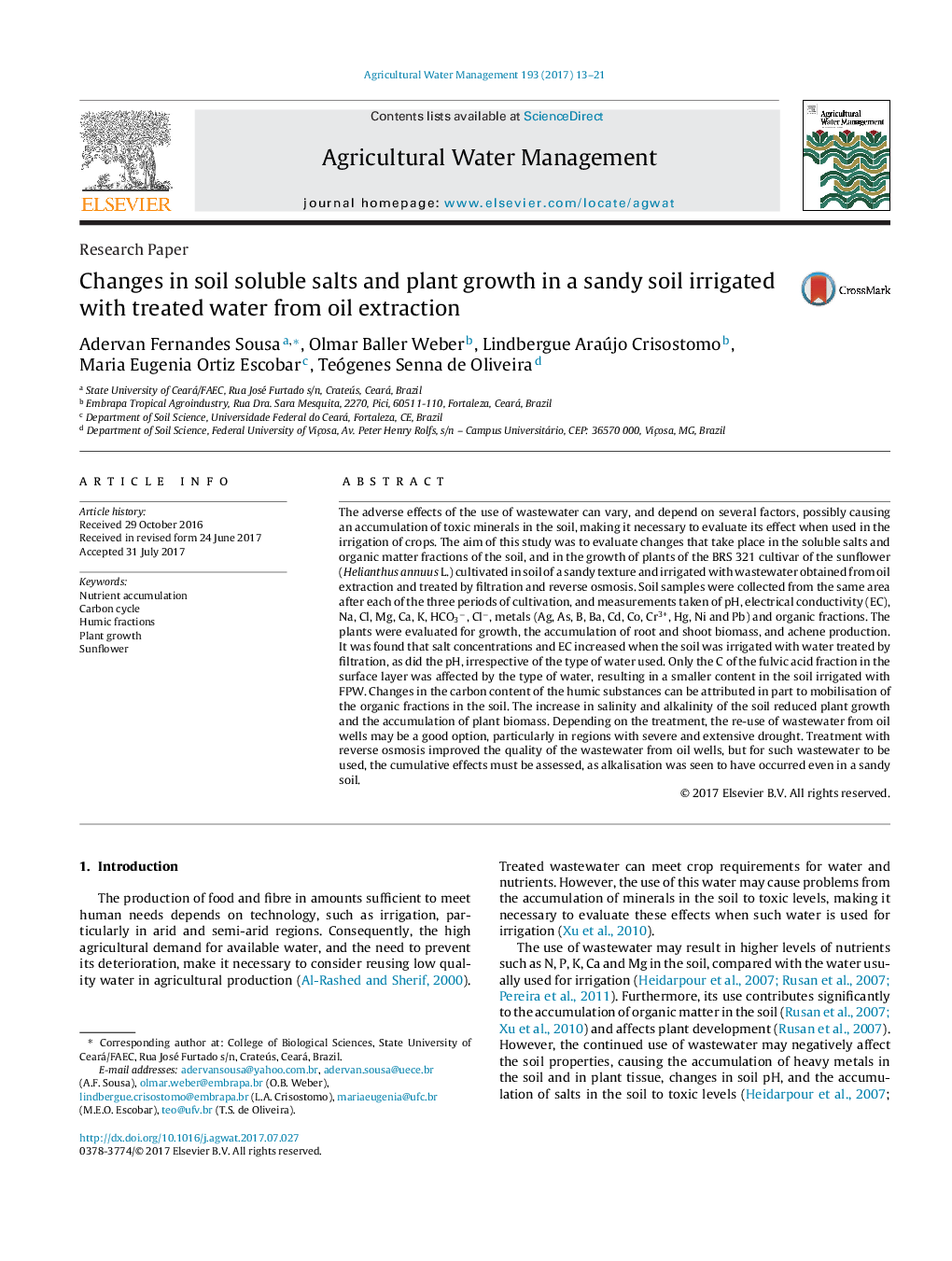| کد مقاله | کد نشریه | سال انتشار | مقاله انگلیسی | نسخه تمام متن |
|---|---|---|---|---|
| 5758256 | 1622887 | 2017 | 9 صفحه PDF | دانلود رایگان |
عنوان انگلیسی مقاله ISI
Changes in soil soluble salts and plant growth in a sandy soil irrigated with treated water from oil extraction
ترجمه فارسی عنوان
تغییرات در نمک های محلول در خاک و رشد گیاه در یک خاک شنی آبیاری شده با آب تصفیه شده از استخراج نفت
دانلود مقاله + سفارش ترجمه
دانلود مقاله ISI انگلیسی
رایگان برای ایرانیان
کلمات کلیدی
موضوعات مرتبط
علوم زیستی و بیوفناوری
علوم کشاورزی و بیولوژیک
علوم زراعت و اصلاح نباتات
چکیده انگلیسی
The adverse effects of the use of wastewater can vary, and depend on several factors, possibly causing an accumulation of toxic minerals in the soil, making it necessary to evaluate its effect when used in the irrigation of crops. The aim of this study was to evaluate changes that take place in the soluble salts and organic matter fractions of the soil, and in the growth of plants of the BRS 321 cultivar of the sunflower (Helianthus annuus L.) cultivated in soil of a sandy texture and irrigated with wastewater obtained from oil extraction and treated by filtration and reverse osmosis. Soil samples were collected from the same area after each of the three periods of cultivation, and measurements taken of pH, electrical conductivity (EC), Na, Cl, Mg, Ca, K, HCO3â, Clâ, metals (Ag, As, B, Ba, Cd, Co, Cr3+, Hg, Ni and Pb) and organic fractions. The plants were evaluated for growth, the accumulation of root and shoot biomass, and achene production. It was found that salt concentrations and EC increased when the soil was irrigated with water treated by filtration, as did the pH, irrespective of the type of water used. Only the C of the fulvic acid fraction in the surface layer was affected by the type of water, resulting in a smaller content in the soil irrigated with FPW. Changes in the carbon content of the humic substances can be attributed in part to mobilisation of the organic fractions in the soil. The increase in salinity and alkalinity of the soil reduced plant growth and the accumulation of plant biomass. Depending on the treatment, the re-use of wastewater from oil wells may be a good option, particularly in regions with severe and extensive drought. Treatment with reverse osmosis improved the quality of the wastewater from oil wells, but for such wastewater to be used, the cumulative effects must be assessed, as alkalisation was seen to have occurred even in a sandy soil.
ناشر
Database: Elsevier - ScienceDirect (ساینس دایرکت)
Journal: Agricultural Water Management - Volume 193, November 2017, Pages 13-21
Journal: Agricultural Water Management - Volume 193, November 2017, Pages 13-21
نویسندگان
Adervan Fernandes Sousa, Olmar Baller Weber, Lindbergue Araújo Crisostomo, Maria Eugenia Ortiz Escobar, Teógenes Senna de Oliveira,
